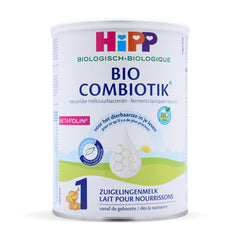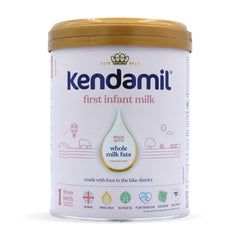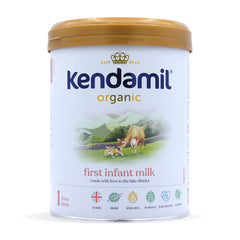Organic vs. Non-Organic Baby Formula: What Parents Need to Know
Baby formulas contain essential minerals, vitamins, and fats that are crucial for infant development. However, parents today face the challenge of choosing between high-quality formula options. Organic and conventional formulas are the most popular choices for parents who prioritize their children's health. This raises an important question: which type of formula is better for your baby — organic or non-organic?
The decision between organic and conventional formula often depends on individual family values, budget constraints, and specific infant needs. Many pediatricians emphasize that both types of formula must meet stringent FDA nutritional requirements, ensuring that babies receive adequate nutrition for proper growth and development. The key difference lies in the sourcing and processing methods rather than the nutritional adequacy of the final product.
Organic formulas are typically made from high-quality ingredients that undergo rigorous testing. Well-known global brands use premium ingredients without GMOs or added sugars. Organic formulas are made from organic milk and contain no synthetic substances or pesticides. The organic certification process requires extensive documentation and regular inspections, which can provide peace of mind for parents concerned about chemical residues in their baby's food.
Conventional formulas are also popular and more affordable, making them accessible to a broader range of families. However, conventional formulas may include ingredients that contain sugars or certain oils. While these ingredients are generally recognized as safe by regulatory agencies, some parents prefer to avoid them when possible. Parents should carefully research whether organic baby formula is truly better when choosing the right formula for their little one, evaluating all the benefits in terms of ingredient composition and their baby's health.
What Makes Baby Formula Organic? Key Standards and Certifications
More parents are choosing organic products each year. Organic baby formula meets strict requirements and standards, with manufacturers using high-quality ingredients to create their products. Organic formula differs from conventional formula in both composition and certification requirements. Here are the key characteristics of organic formula:
-
Organic milk. Strict certification requirements make organic formula an excellent choice. The formula is made from organic dairy produced on certified organic farms, using milk from cows that eat organic feed.
-
Pesticide-free. It's essential to understand whether organic formula is better for feeding your baby. Organic formula contains no pesticides or synthetic materials. All ingredients are certified and tested, containing no artificial additives. The ingredients provide benefits without harmful chemicals for your child.
-
GMO-free. Manufacturers create formulas without GMOs or genetically modified organisms. The formula is certified to ensure it contains no genetically modified ingredients, antibiotics, hormones, or preservatives.
Conventional formula is known for using certain potentially concerning ingredients. Non-organic formulas often contain synthetic vitamins and oils. Manufacturers use cow's milk, but it's produced using conventional farming methods. A non-GMO formula is an excellent way to support babies' health and development.
Many European brands use quality ingredients in their formulas. Parents should consider the well-known brand Kendamil, which offers both organic and conventional options. An excellent example is Kendamil Organic Stage 1 Formula without added GMOs. This formula is designed for children from birth to six months and contains no sugar or other harmful ingredients. Another good option is Kendamil UK Classic Formula Stage 1 without GMOs. This milk formula contains nutritious omega-3 and is free from soy, sugar, and chemicals.
Nutritional Differences: Organic Formula vs. Regular Formula
Parents are increasingly asking about the differences between non-GMO and regular formulas. Organic and conventional baby formulas have different compositions. Both options work well for families and meet government standards. Safety and sterility during formula manufacturing are ensured by relevant authorities. However, organic formulas have stricter requirements for ingredients and manufacturing methods. It's important to evaluate the main differences between organic formula vs regular to understand which formula is best for your child.
Organic Formula:
-
Made from natural ingredients without pesticides, often grown on environmentally friendly farms without synthetic fertilizers.
-
Strictly prohibits synthetic materials, with manufacturers carefully controlling the minimization of artificial flavors, preservatives, and heavy metals.
-
Uses lactose as the main carbohydrate for baby development and natural vegetable oils to provide nutritional value.
-
Contains necessary nutritional vitamins for children, often including DHA, ARA, and healthy fats essential for babies.
Conventional Formula:
-
Contains natural ingredients but may include some synthetic components from ingredients grown on conventional farms, which may contain GMOs and products from chemical processing.
-
May contain certain preservatives and sweeteners that don't pose threats to babies and are government-approved.
-
May contain palm oil, which can be harder for babies to digest, and often includes corn syrup as a sweetener.
-
Like organic formula, it contains all necessary nutrients, including the required amounts of iron, vitamins, DHA, and ARA.
Parents often encounter myths about organic vs non-organic milk. Most parents favor organic formula, thinking conventional is inferior. While organic non-GMO formula does have better composition and ingredients, conventional formula isn't necessarily worse and is also nutritious for babies. The reality is that both types of formula undergo strict quality control measures and must meet identical nutritional standards set by the FDA.
It's worth noting that some babies may actually thrive better on conventional formulas, particularly those with sensitive digestive systems who might react to certain organic ingredients. Additionally, the protein structures in both organic and conventional formulas are virtually identical, as the processing methods used to make them suitable for infant digestion are the same regardless of the original milk source.
Health and Safety Considerations: Is Organic Baby Formula Better?

Organic Life Start offers European quality formulas from various brands. Baby formula is developed according to strict government standards and regulations. High-quality ingredients and natural composition guarantee baby safety and health. An important question arises when choosing between organic and conventional formulas. Many parents wonder if organic baby formula is actually better. Studies on safety and toxicity provide clearer answers.
The best non-toxic baby formula contains no pesticides or chemicals. Manufacturers use high-quality ingredients grown on ecologically clean fields. The product contains no GMOs and minimizes any risks to babies. A great example is organic HiPP Dutch Stage 1 Formula for children up to six months. This formula contains no sugars or soy and includes necessary prebiotics and DHA.
Organic formulas have a lower risk of toxic contamination. The formula undergoes necessary testing and certification for heavy metals. Researchers test formulas for contaminants before they're sold. Organic formula has been shown to improve digestion in many babies and is the best option for babies prone to digestive issues.
While organic milk formula has its benefits, it's essential to consider potential drawbacks. No formula is completely hypoallergenic, which may not suit all babies. The formula contains lactose and cow's milk protein, which can cause allergic reactions. Organic formula is more expensive and less widely available.
When making the decision between organic and conventional formulas, parents should also consider their baby's individual response to feeding. Some infants may experience better digestion with organic formulas due to the absence of certain additives, while others may show no difference at all. Many pediatricians recommend trying one type first and observing how the baby responds before making a permanent switch. It's also important to note that transitioning between different formula types should be done gradually to avoid digestive upset.
Environmental and Ethical Factors Behind Choosing Organic Formula
Parents are increasingly choosing high-quality, natural organic baby formulas. The question isn't only about the formula and its composition but also about production methods. This understanding helps parents properly care for their babies and select the best products. Today, well-known brands like HiPP and Holle use high-quality ingredients and organic products. Here are the key environmental and ethical aspects:
-
Most parents value organic farming practices. Companies that grow ingredients for formulas on environmentally friendly farms are preferable. These companies limit the use of synthetic pesticides, care about ecosystems, and maintain sustainable practices. Choosing non-GMO formula for infants also means supporting a smaller carbon footprint.
-
Animal welfare on farms is equally important. Parents who care about their babies' health are also concerned about how animals are treated. Animals have access to fresh grass and don't consume hormones or antibiotics. Parents often choose environmentally certified brands that prioritize transparency, safety, and social responsibility.
Cost and Accessibility: Weighing Organic Formula Against Non-Organic

Most parents consider both ingredient composition and pricing when choosing formulas. The question of Kendamil organic vs non-organic and other brands plays a significant role. Organic products contain no pesticides and pass all certification checks. Conventional products aren't necessarily worse but may contain certain permissible levels of sugar syrup and pesticides. It's important for parents to understand the price difference and availability of formulas.
-
Organic Formula. Organic formula is usually more expensive due to its organic composition. Brands often offer organic products ranging from $30 to $50 per package. Organic products are available in stores and online but not in large quantities due to limited production. Many parents choose the best organic formula for newborns for their babies' health, often valuing the ingredient composition for mixed feeding alongside breastfeeding.
-
Conventional Formula. Conventional formula is quite budget-friendly, usually costing up to $25. Brands often offer numerous affordable formulas for parents. In stores and online platforms, you can find a large selection of conventional products. Parents often choose conventional formulas if their child doesn't have allergic reactions, often selecting them because of their availability and pricing.
How to Choose the Best Natural and Non-Toxic Baby Formula for Your Baby
The best natural baby formula is an excellent choice for parents who care about their babies' health. When choosing baby formula, parents should consider several key factors. Today, it's important to check the composition and look for beneficial ingredients. Label recommendations help parents understand the composition. Parents should look for certificates and special markings regarding quality standards. Certificates contain information about GMO-free ingredients and pesticide use.
Quality products are available on store shelves and online platforms. Top organic baby formulas can be recommended by pediatricians depending on the baby's condition. Well-known European brands offer the best products. Brands such as HiPP, Holle, and Kendamil have necessary certificates and are time-tested. Many positive reviews prove that these brands offer quality, transparency, and effectiveness. Parents need to balance budget and nutritional needs. Equally important are the baby's personal preferences for particular types of formula.
Final Thoughts: Does Choosing Organic Formula Really Matter?
Non-toxic baby formula is an excellent choice for many parents. Choosing the right formula is important for every family. Opinions differ on selecting organic versus conventional formulas for babies. It's important to consider all the advantages and disadvantages of both types. The benefits of organic formula include increased certification and minimization of pesticides and synthetic compounds. Manufacturers use exclusively natural ingredients grown on environmentally friendly farms.
Conventional products may contain traces and residues of substances permitted by regulations. Choosing the best non-toxic formula helps parents care for their baby's health. Everyone should make informed decisions based on their child's needs. It's important to consider the child's condition and response to particular formulas. It's important to consult with your pediatrician before making a decision. Doctors will help you understand formula compositions and recommend quality options.
Organic Life Start is committed to providing accurate, reliable, and trustworthy information to parents and caregivers. We carefully choose credible sources and follow a meticulous fact-checking process to uphold the highest standards in infant nutrition and parenting advice. To learn more about our dedication to accuracy, please explore our editorial guidelines.
Link To Sources










